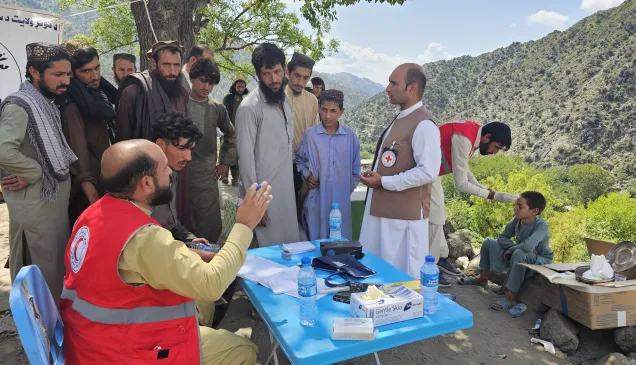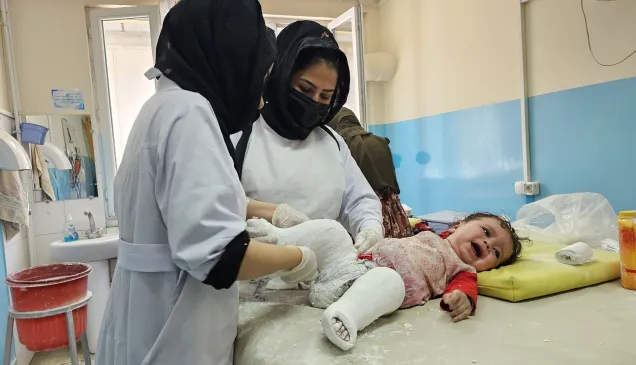Afghanistan: protection of vulnerable communities through cash-for-work projects

The people of Afghanistan faced a grim humanitarian and economic crisis following the change of authorities in August 2021. Decades of past conflict, combined with sudden economic difficulties and worsening climate conditions, had deprived many rural households of their sources of income and eroded vital irrigation infrastructure. As fields dried up and employment opportunities became scarce, the need for an urgent, practical solution became increasingly clear.
Responding to the humanitarian crisis, the International Committee of the Red Cross (ICRC) designed a new approach that could respond to both the immediate and long-term needs of rural communities. Drawing on lessons from previous livelihood and infrastructure programmes, we developed a cash-for-work model that would offer vulnerable communities a means of earning livelihood with dignity while restoring critical infrastructure, such as canals, kariz (underground canals), flood protection walls and check-dams. Besides technical planning, our teams conducted field assessments and consulted local communities to ensure that the designed programmes are inclusive, climate-smart and grounded in community ownership.
Short-term and long-term benefits
The pilot projects were launched in early 2022. Among the first few was the project to build 1,670 metre-long flood walls and place 10,000 gabions (stones in wire cages) in Gulistan district of Farah Province. Involving 382 local workers, the project helped to protect 120 hectares of farmland from seasonal flooding and generated income for over 3,000 people who rely on the farmland, offering both immediate relief and long-term agricultural stability.
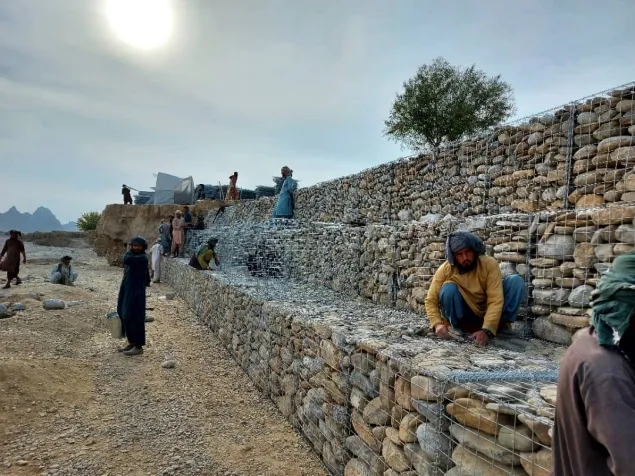
Community workers while positioning gabion baskets to construct a flood wall in Gulistan district of Farah Province.
Building on this momentum, the initiative expanded significantly in 2023 reaching ten provinces through 13 projects. A total of 2,645 people were employed, supporting around 21,000 individuals. That year, the programme prioritized repairing traditional irrigation systems, restoring underground canals and constructing climate-resilient check-dams and retaining walls.
Ghaus Mohammad from Nawzad District of Helmand Province said, “Leaving one's home and land because of lack of water and seeking shelter elsewhere is extremely challenging. Our area had turned into a desert because of water scarcity, causing great distress and uncertainty among our people. After a few years, I was told that the ICRC would help in cleaning and repairing our kariz. When the cleaning and repair work started, I was employed as a labourer along with others from the area. Now, our kariz is restored, providing us with ample water for both farming and drinking.”
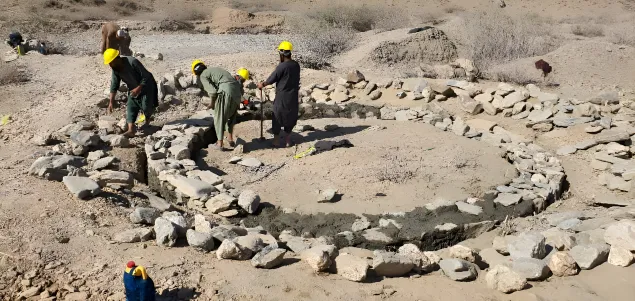
Community workers during cleaning of a Kariz (underground canal) in Nawzad district of Helmand province.
In Northern Helmand, particularly Nawzad district which has been hit hard by the impact of climate change, farmers mainly rely on underground canals for drinking, farming and tending to their livestock. The ICRC’s cash-for-work project was crucial in the region for cleaning and repairing the underground canals for the Althigi community.
In Shah Wali Kot, Kandahar, the community worked on building a 73 metres long and 2.5 metres high check dam, which held up during heavy rainfall, preventing the farmlands from being flooded. The underground water level has also significantly increased for the first time in 15 years, providing adequate water for irrigation and doubling the harvest of crops. Farmers report that while some of them previously struggled a lot to get water through their borewells even at 10-metres depth, now they get sufficient water at 1–3 metres deep.
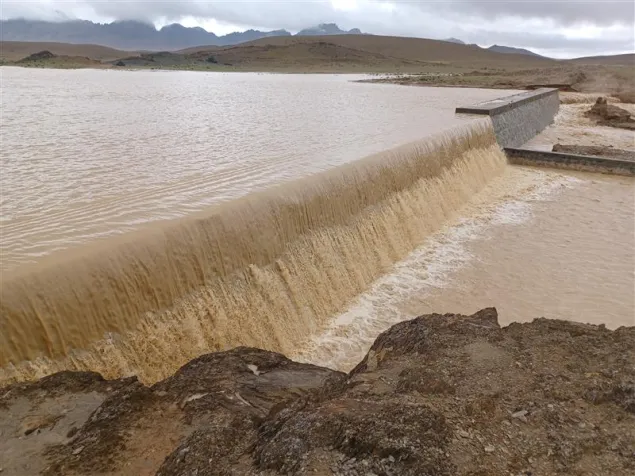
A view of Shahwali Kot’s check dam filled with rainfall water in Kandahar.
In 2024, the initiative achieved its largest footprint, with 16 projects implemented across 14 provinces, employing 3,383 workers and benefiting over 27,000 people. These projects included the clearing of 14 kilometres of irrigation canals, construction of 5 kilometres of protective walls and repairing long-neglected water systems. Follow-up assessments across multiple districts showed 25–40% increase in irrigated land as well as improved sowing season.
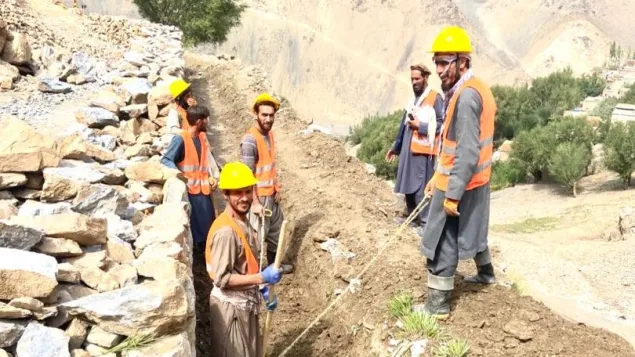
More than 240 community workers joined a project to clean an irrigation canal, benefiting 710 households in Surkhshal village, Paryan district of Panjshir Province.
We were facing financial difficulties, especially during our harsh winters. The ICRC’s project not only provided us with an income but also restored an essential water source for our farmlands. Previously, water was also wasted because of poor management but with the canal functioning properly, I am confident our wheat and potato harvests will bring us good income this year,
said Haji Shah Wali, who lives in Surkhshal village.
In 2025, five new projects were initiated, engaging 535 workers, with plans to complete 20 projects by the end of the year. “The ICRC is also undertaking detailed evaluations to improve targeting and cost-efficiency in future phases. Lessons from earlier years, such as the importance of transparent selection of villages, robust safety protocols and participatory planning are shaping ongoing improvements to the programme.” stated said Janeth Idolog, the ICRC’s economic security coordinator.
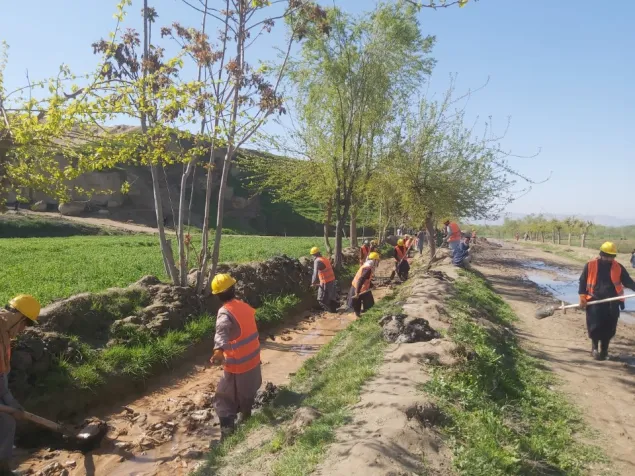
With ICRC’s support, 200 community workers in Zakhil village of Kunduz Province earned short-term income by repairing 8.5 km of irrigation canals & building 2 culverts which improved access to water for around 5,000 households.
Lasting impact on communities
The cash-for-work initiative has sparked transformation across rural Afghanistan. These construction projects have improved access to water for farming communities and helped them better withstand both drought and flooding.
In communities affected by armed conflict, where livelihoods and coping systems have been undermined, cash-for-work prevents people from forced economic migration to unsafe work environments or from getting tangled in the web of debt. By earning short-term income through meaningful labour, households meet their essential needs in a dignified manner, while rebuilding the agricultural infrastructure that conflict once impacted,
said Janeth Idolog, the ICRC’s economic security coordinator.
But the impact seeps much deeper as communities take pride in contributing to rebuilding their lives, resilience and self-sufficiency. While families buy food, school supplies and medicine, local shops and vendors have also benefited from the increased purchasing power. In community feedback sessions known as “tea & talk”, people reported there was improved cooperation among community members, water-sharing agreements and a stronger sense of unity following the projects.
Impact in numbers (2022–2025)
- Total projects: 35+
- Community workers employed: 6,945
(382 in 2022, 2,645 in 2023, 3,383 in 2024, 535 in early 2025) - People supported: 54,000
(based on average household size of 8 members) - Canals cleared or repaired: 14 kilometres long
- Protective walls constructed: 5 kilometres
- Farmland preserved: 120 hectares
- Increase in irrigated land: 25–40%

